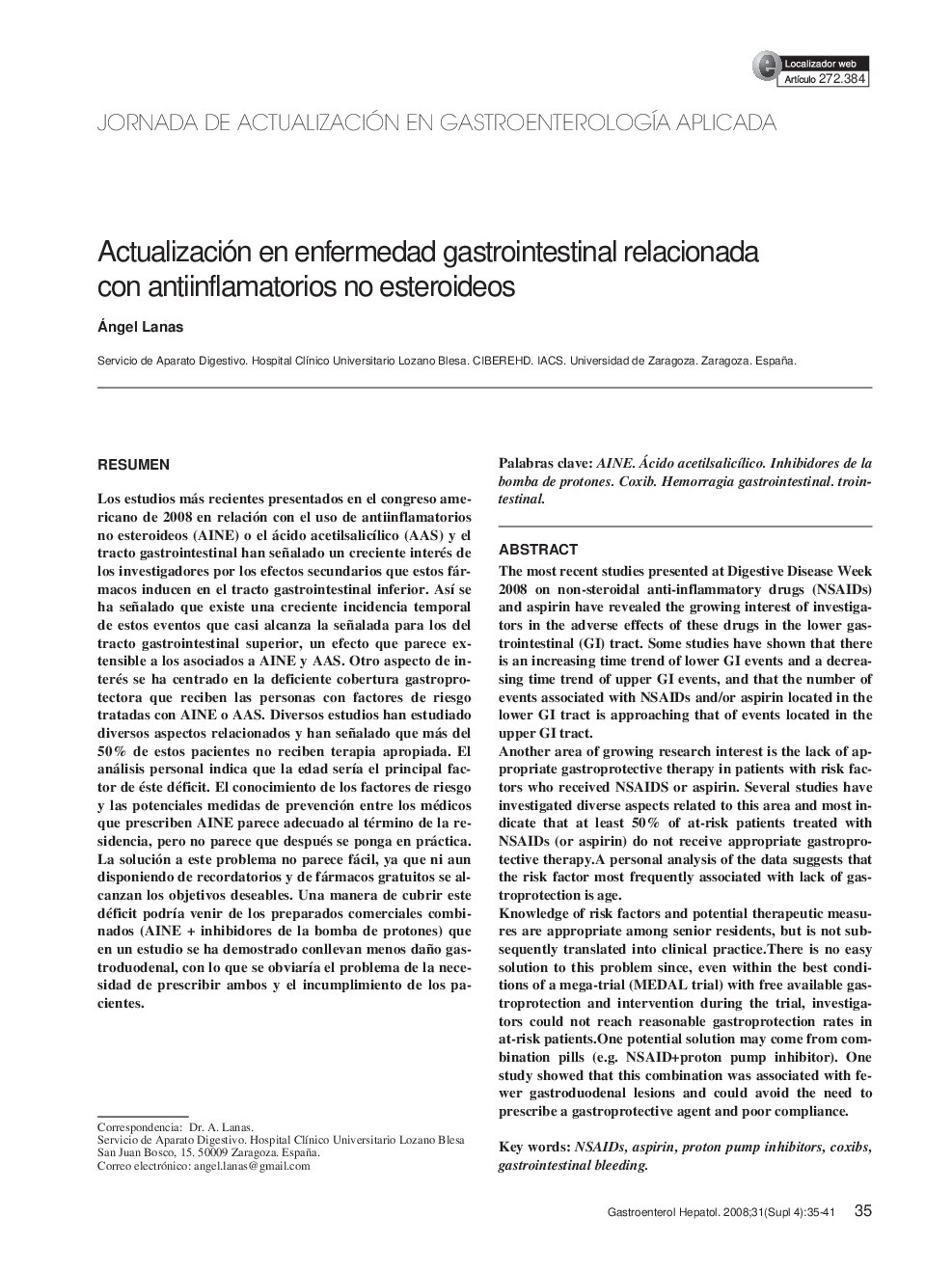| کد مقاله | کد نشریه | سال انتشار | مقاله انگلیسی | نسخه تمام متن |
|---|---|---|---|---|
| 3289236 | 1209559 | 2008 | 7 صفحه PDF | دانلود رایگان |

ResumenLos estudios más recientes presentados en el congreso americano de 2008 en relación con el uso de antiinflamatorios no esteroideos (AINE) o el ácido acetilsalicílico (AAS) y el tracto gastrointestinal han señalado un creciente interés de los investigadores por los efectos secundarios que estos fármacos inducen en el tracto gastrointestinal inferior. Así se ha señalado que existe una creciente incidencia temporal de estos eventos que casi alcanza la señalada para los del tracto gastrointestinal superior, un efecto que parece extensible a los asociados a AINE y AAS. Otro aspecto de interés se ha centrado en la deficiente cobertura gastroprotectora que reciben las personas con factores de riesgo tratadas con AINE o AAS. Diversos estudios han estudiado diversos aspectos relacionados y han señalado que más del 50% de estos pacientes no reciben terapia apropiada. El análisis personal indica que la edad sería el principal factor de éste déficit. El conocimiento de los factores de riesgo y las potenciales medidas de prevención entre los médicos que prescriben AINE parece adecuado al término de la residencia, pero no parece que después se ponga en práctica. La solución a este problema no parece fácil, ya que ni aun disponiendo de recordatorios y de fármacos gratuitos se alcanzan los objetivos deseables. Una manera de cubrir este déficit podría venir de los preparados comerciales combinados (AINE + inhibidores de la bomba de protones) que en un estudio se ha demostrado conllevan menos daño gastroduodenal, con lo que se obviaría el problema de la necesidad de prescribir ambos y el incumplimiento de los pacientes.
The most recent studies presented at Digestive Disease Week 2008 on non-steroidal anti-inflammatory drugs (NSAIDs) and aspirin have revealed the growing interest of investigators in the adverse effects of these drugs in the lower gastrointestinal (GI) tract. Some studies have shown that there is an increasing time trend of lower GI events and a decreasing time trend of upper GI events, and that the number of events associated with NSAIDs and/or aspirin located in the lower GI tract is approaching that of events located in the upper GI tract.Another area of growing research interest is the lack of appropriate gastroprotective therapy in patients with risk factors who received NSAIDS or aspirin. Several studies have investigated diverse aspects related to this area and most indicate that at least 50% of at-risk patients treated with NSAIDs (or aspirin) do not receive appropriate gastroprotective therapy.A personal analysis of the data suggests that the risk factor most frequently associated with lack of gastroprotection is age.Knowledge of risk factors and potential therapeutic measures are appropriate among senior residents, but is not subsequently translated into clinical practice.There is no easy solution to this problem since, even within the best conditions of a mega-trial (MEDAL trial) with free available gastroprotection and intervention during the trial, investigators could not reach reasonable gastroprotection rates in at-risk patients.One potential solution may come from combination pills (e.g. NSAID+proton pump inhibitor). One study showed that this combination was associated with fewer gastroduodenal lesions and could avoid the need to prescribe a gastroprotective agent and poor compliance.
Journal: Gastroenterología y Hepatología - Volume 31, Supplement 4, October 2008, Pages 35-41